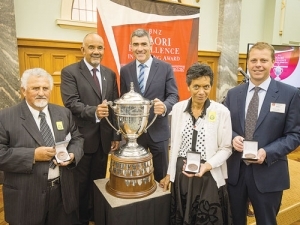Award-winning Māori farm severely damaged by isolated Northland thunderstorm
One of the country's top Māori farms has been badly damaged by a severe isolated thunderstorm which hit parts of the east coast of Northland last week.
 The resilience of Maori agribusiness is back in with the announcement of the finalists in this year's Ahuwhenua trophy competition to find NZ's top Maori dairy farm.
The resilience of Maori agribusiness is back in with the announcement of the finalists in this year's Ahuwhenua trophy competition to find NZ's top Maori dairy farm.
The resilience of Maori agribusiness is back in with the announcement of the finalists in this year's Ahuwhenua trophy competition to find NZ's top Maori dairy farm.
The competition was inaugurated 83 years ago and the fact that every year top Maori farms step up shows clearly the determination and desire in Maoridom to showcase their success and build capability.
During this bad patch for the dairy sector it is interesting to see excellent Maori farms unafraid to put themselves forward and show what they are doing well.
They are displaying great leadership to the whole dairy sector and demonstrating that this is not a time to retreat and hunker down; rather it's a time to showcase the Maori agribusiness model – a long term vision of providing benefits for future, not just the present, generation. Maori have a history of managing adversity and coming back stronger and better.
Not widely known is that entering the contest and making the finals requires a lot of time to provide complex data to two judging panels and run a large field day. The farms are required not only to prove they are financially successful but also that they are leaders in the kaitiakitanga (guardianship of the land) and their whanau.
Few NZer's have much idea about farming, and even fewer have any idea of the scale and efficiency of many Maori farms. Maybe that's because they are tucked away in heartland NZ and not on SH1, or perhaps people just don't believe Maori are capable of success.
This year the Ahuwhenua competition has two finalists from the South Island – Ngai Tahu and Rakaia. This is perhaps a further sign that Maori are starting to rise their profile, showing just how big and good is their vision and ability.
Maori agribusiness, including forestry contributes $3.5 billion to the New Zealand economy. Maori agribusiness is doing extremely well and Miraka Dairy Company won the Maori Excellence in Export Award at the 2015 New Zealand International Business Awards.
The Awuwhenua Trophy competition is hugely important not only for Maori but also for the primary sector as whole.
If they don't celebrate success in the primary sector, no one else is going to do it for them.
Maori agribusiness is no longer an adjunct to the NZ economy; it is now an integral part of it and over time its contribution will grow to new heights – not just in dairying, but in all primary production.
The Meat Industry Association of New Zealand (MIA) today announced that Chief Executive Officer Sirma Karapeeva has resigned from the role.
The winners of the 2026 Hawke’s Bay/Wairarapa Dairy Industry Awards were announced at the annual awards dinner held at Copthorne Solway Park in Masterton on Thursday evening.
Environment Southland is welcoming this week’s decision by the Environmental Protection Authority (EPA) to approve the release of Blaptea elguetai, a leaf‑feeding beetle that will help control the highly invasive Chilean flame creeper.
This March, the potato industry is proudly celebrating International Women’s Day on 8 March alongside the International Year of the Woman Farmer, recognising the vital role women play across every part of the sector — from paddocks and packhouses to research, leadership, and innovation.
Fruit trader Seeka posted a record profit and returns to shareholders in 2025.
Recent weather events in the Bay of Plenty, Gisborne/Tairawhiti, and Canterbury have been declared a medium-scale adverse event.
OPINION: Staying with politics, with less than nine months to go before the general elections, there’s confusion in the Labour…
OPINION: Winston Peters' tirade against the free trade deal stitched with India may not be all political posturing by the…